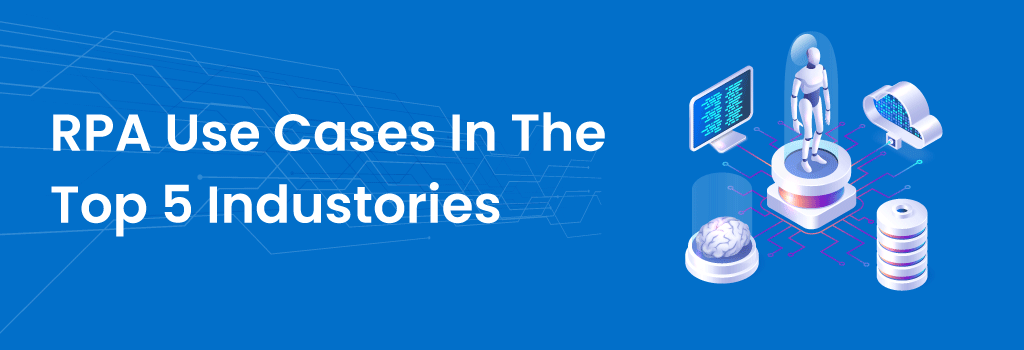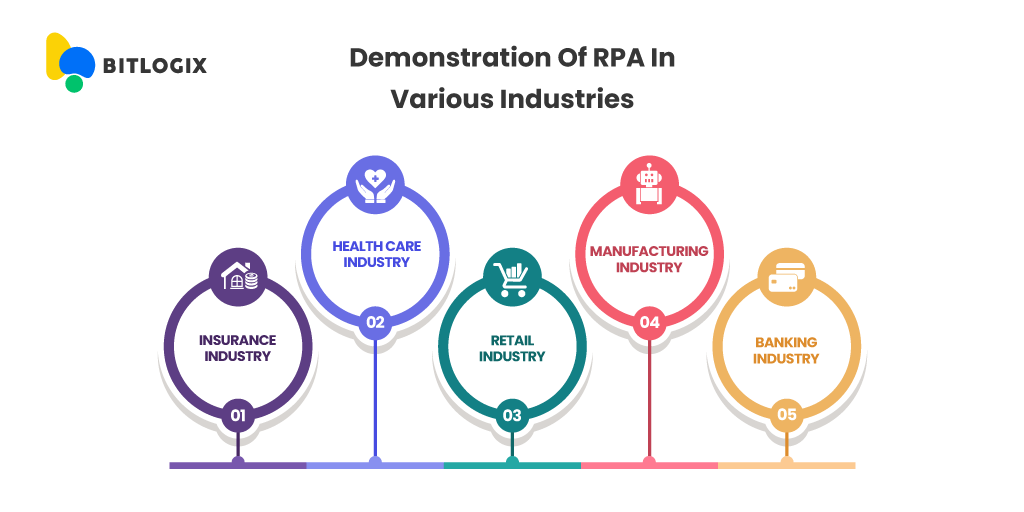
McKinsey has estimated that automating business tasks via RPA offers a potential ROI of 30–200% within the first year alone.
Deloitte estimates that, on average, 20% of full-time equivalent capacity could be replaced by bots. Those who have implemented RPA have better outcomes. They experienced a considerable increase in capacity around 52%.
Here is the breakdown of how RPA is performing a key role in different industries.
Demonstration Of RPA In Various Industries
RPA can perform any tasks similar to humans with more productive results in different industries. Let’s explore its effectiveness and increasing involvement in some of the most important industries.
- Insurance industry
- Health care industry
- Retail industry
- Manufacturing industry
- Banking industry

1. Insurance Industry
According to the reports of Statista, RPA has the capacity to take the insurance industry from $8 billion to $ 688 in the period of 2000 to 2026.
A McKinsey study found that RPA for insurance may reduce the data processing time by 34%.
As a paper-intensive and monotonous industry, the insurance industry is well suited for automation. Data entry and review applications are some of the basic tasks that involve the active presence of RPA tools to automate processes. The insurance industry majorly deals with data, where RPA can be a game changer for insurers.
RPA has the capacity to integrate multiple insurance processes with the aim of facilitating insurers and simplifying the insurance processes. Let’s dig deeper to know more about how RPA can assist the insurance industry or what processes can be streamlined through RPA.
1.1 Processes Where RPA Is Helping the Insurance Industry
-
- Claim registration and processing
- Underwriting
- Regulatory compliance
- Process and business analytics
- Policy admin and servicing
- Form registration and
- Sales and distribution
- Integration with legacy applications
- The manual data entry process
- Blend new technologies with the existing system
2. Healthcare Industry
McKinsey & Company has predicted that up to 36% of healthcare has the potential to be automated with attended robots; UiPath estimates that by including unattended robots, up to 60% of the value chain can benefit from RPA. By contrast, 36% of the processes can be automated with attended robots in five to six weeks.
RPA has gained mainstream adoption in healthcare by offering automation solutions in most medical industry domains. Its implementation will benefit patients by improving their access to quality medical services and hospital staff by streamlining and simplifying their tasks.
2.1 Processes Where RPA Can Work Well
-
- Electronics record and data share
- Appointment scheduling
- Billing payments and claim management
- Tracking hospital equipment
- Data analytics and diagnostic
- Post-treatment care
- Supporting analytics to improve treatment
- Invoice preparation
-
2.2 Outcomes
-
- With RPA implementation, the appointment booking process has become streamlined and easy for patients and medical staff.
-
- Data management has become quick and secure with the help of RP.
-
- RPA has improved customer dealing parameters in hospitals.
- RPA has made easy access to patients’ medical history for doctors.
- RPA has automated the payment processes in hospitals.
- RPA manages time-consuming data management tasks with better efficiency and accuracy.
- With automation in processes, patients and doctors can track the steps of the process. Patients can have access to online reports and track the appointment process.
-
- RPA improves compliance and confidentiality process in hospitals. Moreover, it reduces the turnover time and improves the user experience.
3. Retail industry
Retail sales have declined by 3% from 2019 to 2020, but e-commerce sales increased by more than 27 in the same period, which throws light on the growing role and effectiveness of RPA in the retail industry.
Walmart is the best example of RPA implementation, facilitating thousands of users with equal importance and better user experience. Customers expect a faster shopping experience with an uncompromising attitude towards error.
As a heavily consumer-driven industry that is growing rapidly, it is vital that players in the Consumer-Packaged Goods (CPG) and Retail industries use technology to accelerate their retail processes. Process improvement is the most important factor in expanding the satisfied consumer base. RPA can offer promising advantages to the retail industry by automating most of the tasks that are ultimately lined with a better user experience.
3.1 Processes Where RPA Is Helping The Retail Industry
-
- Store planning
- Inventory management
- Product categorization
- Supply chain management
- Business and sales analytics
- Launching new products
- Customer loyalty programs
- Integrating store and e-commerce
- Invoice processing
- Document exchange.
- New product introductions.
- Business & sales analytics.
- Store planning & inventory management.
- Demand-supply planning.
- Marketing planning.
4. Manufacturing Industry
According to the research, the global robotic process automation (RPA) market size in the manufacturing market has reached USD 7.60 Billion in 2021 and is further expected to register a revenue CAGR of 33.2% during the forecast period 2022-2030.
The manufacturing industry needs to keep up with the ever-growing demand for better and more efficient production. Procurement, inventory management, and payment processing are all time-consuming processes that manufacturers must manage while reducing costs and improving business operations in accordance with regulatory compliance. RPA can manage these basic manufacturing processes and improve operation agility across different manufacturing departments.
4.1 How RPA Can Help The Manufacturing Industry
RPA can help manufacturers keep track of every activity, from managing raw materials to keeping track of every step involved in production. It helps the manufacturing industry tackle processes such as inventory management, regulatory compliance, purchase order processing, invoice verification, customer service, and more. Automating these crucial processes is helping manufacturing companies worry less about repetitive tasks and focus more on improving quality and growth.
-
- Purchase order creation
- Inventory management
- Invoice processing
- Bill of materials
- Customer service
- Strategic management of IT operations
- Proactive risk management
- Logistics data automation
- Data migration
- ERP Automation
5. Banking Industry
According to the report of Allied Market Research, the global RPA and hyper-automation in the banking market generated $745.4 million in 2021 and is estimated to reach $7.1 billion by 2031, witnessing a CAGR of 25.7% from 2022 to 2023.
Adopting RPA in the banking sector has significantly helped in reducing costs by 30 percent to 70 percent, and Robotic Process Automation (RPA) saves labour costs and operational efficiency accuracy 24/7, offering innovative services and a better experience for the customer.
The banking industry is highly dependent on data, and sometimes it becomes difficult for the banking sector to deal with the sensitivity of the data. RPA helps combat the challenges faced by the banking sector. Moreover, RPA can help the banking sector with various banking processes listed below.
5.1 Processes Where RPA Is Helping The Banking Sector
-
- Contact centre optimization
- Trade finance operations
- Customer onboarding
- Anti-money laundering
- Bank guarantee closures
- Bank reconciliation process
- Loan application processing
- Automated report generation
- Account closure processing
- Credit card application processing
- Consumer loan processing
- Fraud detection
- Account origination
- Account receivable
- Account payable
- Deposit processing
- Mortgage processing
- Check to process
- Underwriting support
- Cash collection and deposits
Final words
RPA is significantly impacting every other industry. Its involvement caused mainstream positive changes in the different departments of industries. Industries are yielding productive benefits with the help of RPA. BITLogix has been offering RPA solutions to modernize industries with intelligent automation. Intelligence automation will help you achieve the best result and improve the business processes of your business. Our team will be happy to serve you; drop us a call to book your free demo.